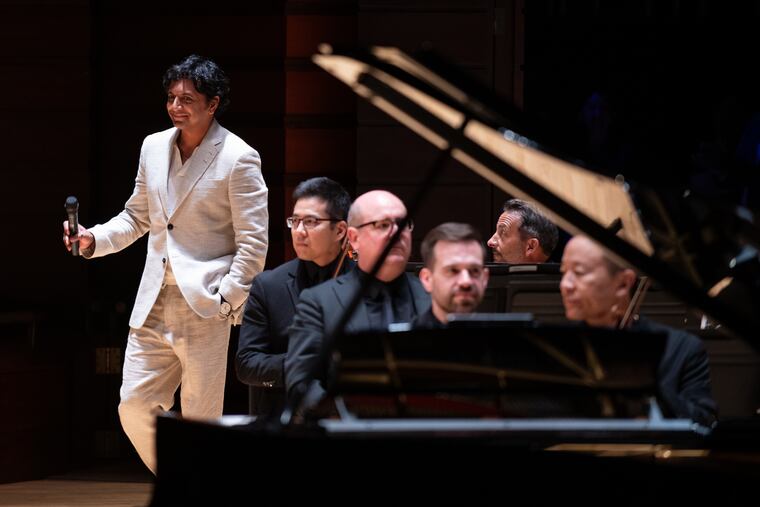Has M. Night Shyamalan become a music genre? Friday he showed up at the Philadelphia Orchestra to test the idea.
"This is like my heart and my home coming together for the first time in a way,” the Philly filmmaker said.

“Sometimes people really refer to my movies — they go, ‘Oh, you make scary movies,’ and I go, ‘I guess so.’ And it’s part of it.”
But the thing that sets M. Night Shyamalan apart as a filmmaker is a sweet sense of brooding and melancholy, and more than anything else it’s the music that drenches the viewer in this aching, worrisome world apart.
If Shyamalan has become a musical genre, it is because of composer James Newton Howard. Both appeared on stage Friday night with the Philadelphia Orchestra in Marian Anderson Hall for an evening of musical elaborations on the eight films they’ve done together.
Shyamalan was direct in noting his debt to Howard:
“I just can’t say enough of what he represents,” he told the audience. “He represents kind of the truth of my heart in these stories, so that they’re not just scary movies.”
Divorced from their visual source (no film was shown during the concert), the music was less menacing than dreamily imploring. The soul was free to conjure its own imagery to the music — memories, feelings, personal narrative — or none at all. For the classical novice, the concert was a lifting of the veil, where connections could be made with once-invisible instrumental sources: “Oh, that sound is made by that percussion instrument.”
The format, dubbed “Night After Night,” mirrored a Sony Classical recording from last year. But this performance featured Shyamalan’s hometown ensemble, and “to have it played by the Philadelphia Orchestra … this is like my heart and my home coming together for the first time in a way,” he said.
In his trademark poet-philosopher voice, Shyamalan paid tribute to what it takes to rise to the top of the classical discipline — “subjugating the corporal to get to the divine.”
Ask the members of the orchestra how they feel about the amount of film music being programmed these days and you’ll hear a range of opinions, but if there was a single player less than fully committed to Friday’s music, it wasn’t apparent. Howard is stylistically catholic (his 35-year-old amber score to Pretty Woman still tells us everything is going to be all right), but on this night his sound existed within a fairly narrow emotional range, and it gained juice being played by this particular orchestra.
With help from the Philadelphia Symphonic Choir in wordless tones, the music in the suite from Unbreakable says something unusual is happening and you need to pay attention to it, an idea lulled to conclusion by a soulful solo from trumpeter Jeffrey Curnow. Clarinetist Samuel Caviezel brought resolution to the moving music from The Village. Howard conducted most of the night, but in suites from Signs and Lady in the Water, the orchestra’s new assistant conductor, Naomi Woo, was able to bring out an urgency and generous swells of goodness that align with the core strengths of this orchestra.
The Hollywood star power on stage was matched by some big classical names. Cellist Maya Beiser was a lonely voice in The Happening, and violinist Gil Shaham and pianist Jean-Yves Thibaudet were sincerity itself in The Village. Thibaudet was the common thread for the evening, sometimes taking the spotlight, other times adding texture.
For all of the fruits of the Shyamalan-Howard partnership laid out for the evening, it was striking to feel that The Sixth Sense still stands out as something special. Maybe it’s the poignant harmonic shifts or the glowing orchestrations. Maybe it’s who these two artists were at the beginning of their collaboration, or who I was when I first saw the film. More likely, they caught something about the character of Philadelphia, some deep connection to what it means to be human, that the rest of us were just too close to sense.